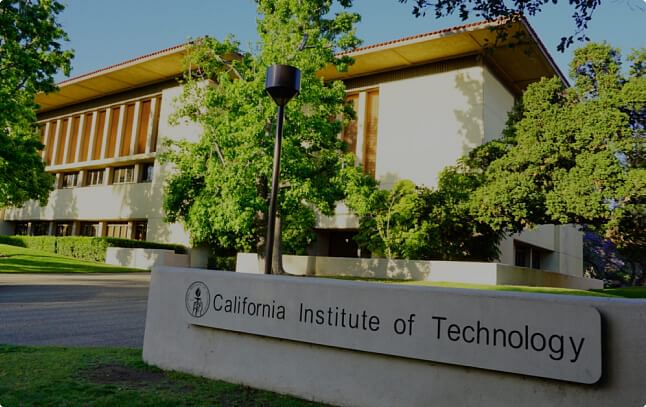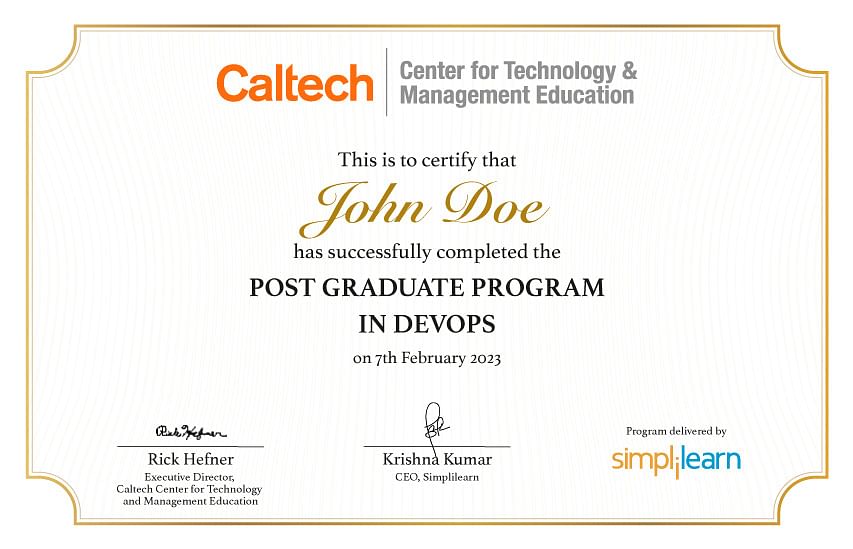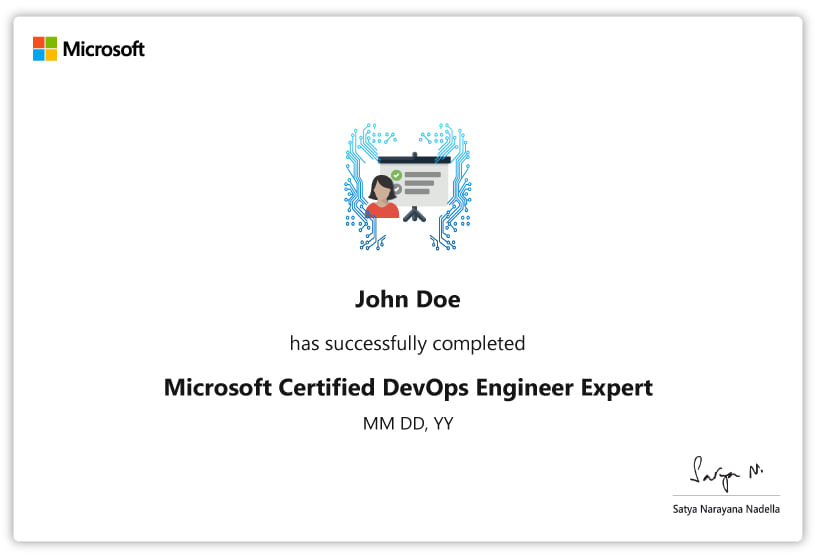Post Graduate Program in DevOps
Industry-Ready DevOps Course in collaboration with Caltech CTME
Become a certified DevOps professional with our Post Graduate Program in DevOps Course, in collaboration with Caltech CTME and IBM. Streamline development by documenting processes, creating self-explanatory systems, and delivering applications faster than traditional software development processes
- Admission closes on 22 May, 2024
- Program Duration 9 months
- Learning Format Online Bootcamp
World’s #1 Online Bootcamp
Why Join this Program
Caltech Circle Membership
Access the Caltech CTME Circle Membership. Attend an online convocation by CTME Program Director.
Caltech's Academic Excellence
Validate your learning with a post graduate certificate and completion letter from Caltech CTME.
IBM’s Industry Expertise
Attend masterclasses by IBM professionals and earn industry-recognized IBM course certificates.
Microsoft DevOps Certification
Be able to access the Microsoft Learn portal and earn an MS-branded certificate.
Global Career Opportunities
DevOps is expected to grow 25 percent annually from 2024 to 2032, aligning with cloud and microservices. The market's current emphasis will be on QA, real-time monitoring, and security through access controls, encryption, and AI-driven solutions.
Industry Hiring Trends
in-demand jobs globally
Top 10average YoY salary growth
12%Increase in DevSecOps demand
60%Top Companies hiring
Career Growth Stories
The course has helped with expanding my business and increasing my earnings. After taking the course, I could add five such clients to my portfolio, which increased my revenue. Moreover, I served my clients better with more market insights and in-depth knowledge.
- Ravi KumarFreelancerManaging Partner
DevOps Training Overview
This DevOps Course, offered in collaboration with Caltech CTME, combines self-paced videos, live classes by industry experts, masterclasses by Caltech instructors, live sessions by IBM experts, and case studies to enable you to apply your newly acquired DevOps skills. You will also get access to Simplilearn Job Assistance services.
Key Features
- A postgraduate certificate from Caltech CTME (Digital & Physical)
- Up to 20 CEUs from Caltech CTME upon program completion
- Program Performance Report for the entire learning path
- 50+ hours of self-paced learning course content
- Earn an invitation to the Caltech CTME Circle Membership
- Microsoft Learn portal access and an MS-branded certificate
- Microsoft Learn portal access and an MS-branded certificate
- Access Simplilearn's JobAssist Service to get noticed by top hiring companies
- Access capstone projects in 3 domains
- Attend masterclasses from Caltech CTME instructors
- Simplilearn Career Service helps you get noticed by top hiring companies
- Participate in live virtual classes led by industry experts, hands-on projects, and integrated labs
- Attend live sessions on the latest AI trends, such as generative AI, prompt engineering, explainable AI, and more
DevOps Course Advantage
The Post Graduate Program in DevOps in collaboration with Caltech CTME will help you transform how organizations develop, deploy, and manage software. You will also learn how to implement DevSecOps to ensure application and infrastructure security.

Collaboration with Caltech CTME
- Caltech CTME Post Graduate Certificate
- Program Performance Report for the entire learning path
- Caltech CTME Circle membership

Microsoft Collaboration
- Get an official course completion badge/certificate hosted on the Microsoft Learn portal
- Acquire an official Microsoft course completion transcript
DevOps Course & Training Details
Begin your DevOps Course journey by taking our Post Graduate DevOps certification Program. Learn to apply DevOps concepts and leverage tools like Git, GitHub, Docker, CI/CD with Jenkins, Kubernetes, DevSecOps, Prometheus, serverless architecture, microservice architecture, Grafana, and more.
Learning Path
Get started with the Post Graduate Program in DevOps in collaboration with Caltech CTME and explore everything about this DevOps certification course. Kickstart your DevOps journey with our preparatory courses: Linux Training, Programming Refresher, Agile Scrum Foundation, Agile Scrum Master.
- Understand the principles and benefits of DevOps and the limitations of traditional approaches
- Explore DevOps architecture, lifecycles, and hands-on practices leveraging essential tools such as Jenkins, GitHub Actions, and version control systems
- Master DevSecOps principles and its best practices through case studies for practical experience
- Learn to manage and automate infrastructure with Ansible and Terraform to ensure efficiency and scalability
- Master Ansible's features and benefits compared to Puppet and Chef and apply it in real-world scenarios
- Understand Terraform's role in IT automation, compare it with CloudFormation and Pulumi, and harness it for efficient infrastructure management
- Learn Docker basics, including architecture, images, and registries
- Understand Docker networking and orchestration with Swarm and Kubernetes
- Explore Docker storage, microservices, and security best practices
- Learn the basics such as architecture, container runtime, and key components like Kubelets
- Develop deployment strategies, workload scaling, self-healing pods, and application configuration
- Explore networking models, services, load balancing, security measures like RBAC, secrets management, and network policies
- Understand core concepts, and set up Prometheus for metrics and Grafana for visualization
- Learn centralized logging with Elasticsearch, Logstash, and Kibana
- Integrate logging with CI/CD, apply security measures, and leverage advanced analytics for insights
- Learn about AWS infrastructure, core services, and management tools like IAM and CloudFormation
- Explore AWS DevOps services like CodeCommit, CodePipeline, and Elastic Beanstalk for CI/CD workflows
- Understand Amazon EKS, its components, networking, autoscaling, and integration with other AWS services
- Explore the concept, necessity, and best practices of integrating security into DevOps processes
- Learn about STRIDE, DREAD, and PASTA methodologies and their application in threat modeling
- Discover the phases of a DevSecOps pipeline, including SAST, DAST, SCA, penetration testing, and vulnerability assessment
- Understand serverless architecture, compare it with traditional and cloud computing, explore providers, and learn about its applications and use cases
- Learn AWS Lambda functions, including key features, deployment and security considerations, and practical use cases for event-driven applications
- Leverage AWS Fargate to manage serverless computing and container management and how it compares to Amazon EC2
- Solve real-world scenarios with hands-on practice via capstone projects
- Practice via solving industry-oriented problem statements
- Showcase your learnings to employers, strengthening your professional network
Electives:
Attend online interactive masterclasses conducted by the Caltech CTME instructors and learn about advancements in technology/techniques in the DevOps domain.
In this module from IBM, you will learn how to create containers for your applications using Docker in production and solve problems of orchestration.
In this module from IBM, you will learn about Kubernetes which is an open-source container orchestration platform that automates deployment, management and scaling of applications.
Attend online interactive masterclasses conducted by IBM instructors and learn the practical application of acquired skills in DevOps
Attend this live online immersive masterclass on Generative AI designed to empower participants with the knowledge and skills to harness its incredible potential. These cutting-edge masterclasses are conducted by industry experts and delve deep into the world of AI-powered creativity, helping you to understand various concepts & topics related to generative AI.
Develop advanced skills in DevOps and Azure, including implementation strategy, security, compliance planning, and Azure Service Fabric setup, leading to a Microsoft Certified DevOps Engineer Expert certification.
Contact Us
1-844-532-7688
( Toll Free )
Skills Covered
- DevOps Methodology
- Continuous Integration
- Continuous Delivery
- Configuration Management
- Containerization
- DevOps on AWS
- Source Control
- Deployment Automation
- Cloud Platforms
- DevSecOps
- Version Control Systems VCS
- Infrastructure as Code IaC
- Azure DevOps
- Serverless Architecture
- Infrastructure Provisioning
- Microservices
- Configuration Management
- Logging and Monitoring
- Orchestration
Capstone Projects
- Project 1
ASI Insurance
Create a DevOps pipeline for an insurance company to build and deploy a microservice application architecture on Docker.
- Project 2
Orbit Bank
Deploy a banking application that helps private banking clients manage their accounting on a Kubernetes cluster from Docker Hub.
- Project 3
HotelSide Hospital
Automate and provision infrastructure using Terraform, EKS cluster, EC2 instances, and Jenkins server.
Disclaimer - The projects have been built leveraging real publicly available data-sets of the mentioned organizations.
Program Advisors

Rick Hefner
Caltech CTME, Executive DirectorDr. Rick Hefner serves as the Executive Director for Caltech’s CTME, where he develops customized training programs for technology-driven organizations. He has over 40 years of experience in systems development and has served in academic, industrial, and research positions.

Eugene Lai
DevOps ConsultantEugene Lai is an innovator in Information Technology and process engineering with over 20 years of experience in leading DevOps teams. He has served as Lead Software Engineer, Chief Scrum Master, Chief Product Owner, Principle Program Manager, Technical Consultant and Agile Coach/Trainer.
Career Support
Simplilearn Career Assistance
Simplilearn’s Career Assist program, offered in partnership with Talent Inc, is a service to help you to be career ready for the workforce and land your dream job in U.S. markets.One-on-one Interview Service by TopInterview
Get a Resume Makeover from TopResume
Reach numerous employers with ResumeRabbit
Complete Candidate Confidentiality Assured
DevOps Industry Trends
DevOps is expected to significantly expand in the upcoming years, with a projected yearly growth rate of 25% from 2024 to 2032, As per N-ix. Integrating AI and ML into the software development life cycle is the primary catalyst for this growth.
Predicted Market Growth
Average annual salary of a DevOps professional in the U.S.S
Forecasted DevOps market size by 2032
Hiring Companies
Batch Profile
This DevOps course caters to working professionals from a variety of industries and backgrounds; the diversity of our students adds richness to class discussions and interactions.
- The class consists of learners from excellent organizations and diverse industriesIndustryInformation Technology - 38%Software Product - 32%Banking - 9%Telecommunications - 7%BFSI - 3%Others - 11%Companies












Alumni Testimonial
Coming from a non-DevOps;background, it was earlier difficult for me to carry out various DevOps projects at my company. So, I took Simplilearn PGP in DevOps in association with Caltech CTME. After the course, my company gave me many DevOps projects such as the opportunity to configure and maintain the Nexus Repository which is used to store all our Artifacts for the Development team. Simplilearn goes by its name &;learn simply&;.
Milan Mithbaokar
Principal DevOps Infrastructure Engineer
What other learners are saying
Admission Details
Application Process
The application process consists of three simple steps. An offer of admission will be made to the selected candidates and accepted by the candidates by paying the admission fee.
Submit Application
Tell us a bit about yourself and why you want to do this program
Application Review
An admission panel will shortlist candidates based on their application
Admission
Selected candidates can begin the program within 1-2 weeks
Eligibility Criteria
For admission to this Post Graduate Program in DevOps, candidates:
Admission Fee & Financing
The admission fee for this DevOps Training certification program is $ 4,849. This fee also includes all applicable program charges.
Financing Options
We are dedicated to making our programs accessible. We are committed to helping you find a way to budget for this program and offer a variety of financing options to make it more economical.
Pay in Installments
You can pay monthly installments for Post Graduate Programs using Splitit, ClimbCredit or Klarna payment option with low APR and no hidden fees.
Other Payment Options
We provide the following options for one-time payment
- Credit Card
- Paypal
$ 4,849
Apply Now
Program Benefits
- Receive a postgraduate certificate from Caltech CTME
- Exposure to prompt engineering, ChatGPT, generative AI etc
- Masterclasses by Caltech instructors and IBM experts
- Official Microsoft Learn content and certificate
- Program completion letter from Caltech CTME
Program Cohorts
Next Cohort
Date
Time
Batch Type
- Program Induction
22 May, 2024
08:30 CDT
- Regular Classes
22 Jun, 2024 - 15 Feb, 2025
08:30 - 12:30 CDT
Weekend (Sat - Sun)
DevOps Training FAQs
What are the eligibility criteria for this Post Graduate Program in DevOps (DevOps Training) in collaboration with Caltech CTME?
For admission to this Post Graduate Program in DevOps (DevOps Certification Training), candidates:
- Should have a bachelor's degree in any discipline with an average of 50% or higher marks
- May have a non-programming background
- Are not required to have prior work experience
What is the admission process for this Post Graduate Program in DevOps in collaboration with Caltech CTME?
The admission process for the Post Graduate Program in DevOps consists of three simple steps:
- All interested candidates are required to apply through the online application form
- An admission panel will shortlist the candidates based on their application
- An offer of admission will be made to the selected candidates and is accepted by the candidates by paying the program fee
As a part of this DevOps Training, you will receive the following:
- Caltech CTME Post Graduate Certificate
- Caltech CTME Bonafide Certificate
- Individual Course Completion Certificate for all the courses in the learning path from Simplilearn
- Program Performance Report for the entire learning path in the program
- Receive 25 CEUs from Caltech CTME upon course completion
- Caltech CTME Circle Membership
- Physical Certificate from Caltech CTME (on request)
Yes, you can cancel your enrollment to this DevOps course if necessary. We will refund the program price after deducting an administration fee. To learn more, please read our Refund Policy.
* Disclaimer
All programs are offered on a non-credit basis and are not transferable to a degree.Both Cloud and DevOps professionals undertaking this program have higher chances to grow in their careers or their current job roles. Other than that professionals in the IT field can also opt for this DevOps training since learning and upskilling always comes with their own shades of advantage, and in-demand skills on your CV is always a plus point.
The DevOps Post Graduate Program certificate comes with lifelong validity.
To enroll in this Caltech DevOps course you must have a bachelor’s degree with an average of 50% higher marks. However, you can belong to a programming or non-programming background, and you don’t need any industry experience as such.
You will learn some of the most in-demand DevOps skills during this post graduate program in DevOps like CI/CD, containerization, source control, deployment automation, and more.
A certified DevOps professional can earn over $121K annually. (source - payscale)
Upon completing the IBM courses at Simplilearn, students can obtain an official IBM course completion certificate, validating their successful completion.
DevOps is a methodology for blending software development (Dev) with operations (Ops). DevOps helps to fill the gap between software and development teams to make them work together to develop, test, and release software with high efficacy and within a short time frame.
A DevOps Certification proves that you have the most up-to-date DevOps skills and are ready to take up the responsibilities of a DevOps Engineer. The best devops certifications demonstrate your basic and advanced knowledge of DevOps concepts and how you can implement DevOps into practice effectively.
One of the many benefits of DevOps Certification is that upon completing the minimum requirements for each course in the learning path, you will be eligible to receive the Post Graduate Program certificate that will testify to your skills as an expert in DevOps.
Yes, any non-IT professional can enter into DevOps. However, acquiring the right skills will require a considerable amount of time. You can start your DevOps journey with Simplilearn’s DevOps tutorial for beginners. After gaining basic knowledge, you can opt for an advanced course in DevOps for a more comprehensive learning experience.
Yes, professionals are expected to have basic programming skills when starting a career in DevOps. However, Simplilearn’s DevOps course is suitable for candidates from both programming and non-programming backgrounds.
Many companies are taking a DevOps approach these days to enable better collaboration between the development and operations teams, fewer miscommunications, quick response to changes, and faster completion of their projects. As a result, you will find a growing demand for DevOps jobs like a DevOps engineer, site reliability engineer, release manager, building engineer, and product manager. With our DevOps certification, you can increase your credibility for such job roles.
A certified DevOps professional can earn over $117K annually. (source - glassdoor)
Simplilearn’s DevOps Certification gives you a clear understanding of the following key topics:
- DevOps tools and methodologies
- Implementing DevOps practices in an organization
- Core Docker technologies
- Automating continuous integration and continuous delivery
- Networking in Kubernetes
While non-IT professionals can enroll for this DevOps course, a basic understanding of web development, Linux, and Java programming will be advantageous to help you grasp the topics faster. Prior work experience in the domain is, however, not mandatory.
As a part of Simplilearn's DevOps certification course, you will learn technical and non-technical skills that help you become a DevOps expert and enhance your career choices. You will be proficient in security skills, automation skills, coding and scripting, testing skills, Linux fundamentals and scripting skills, cloud skills, and many more.
This course will help you understand and learn relevant DevOps tools and technologies. From configuration and version management to continuous integration and continuous delivery, you will become a DevOps expert.
You can learn and excel at DevOps skills and concepts along with soft skills, decision-making, communication and collaboration, proactiveness, etc.
By the time you complete Simplilearn's DevOps certification training, you will excel in the following skills:
- DevOps on Cloud
- DevOps Methodology
- Continuous Integration
- Continuous Delivery
- Source Control
- Source Code Management
- Configuration Management
- Containerization
- Logging and Monitoring Clusters
- Provisioning and Monitoring Resources
- Deployment Automation
- Cloud Platforms
In addition, you will learn about many DevOps tools covered in this certification course, such as Terraform, Maven, Ansible, Jenkins, Kubernetes, Docker FSD, Nagios, TeamCity, CVS, JUnit, SUBVERSION, GitHub, etc.
Yes, DevOps certifications are valuable, offering high-paying job prospects and skill enhancement.
- Automation Expertise: DevOps certifications boost productivity by automating operations, reducing costs, and improving speed, quality, and customer satisfaction through continuous integration.
- Job Security: The demand for certified DevOps professionals is high, ensuring job stability and career advancement opportunities.
- Diverse Career Paths: Certification opens doors to various roles, such as DevOps Architect, Cloud Engineer, Release Manager, etc., enhancing demand and career prospects.
- Higher Income: Certified DevOps professionals command better salaries and benefits due to high demand from global companies.
- Future Growth: DevOps is a burgeoning field, promising continuous professional growth and ample job opportunities for certified individuals.
With the rising demand for DevOps professionals, there are many benefits of getting DevOps Certification, such as numerous career options, high-paying jobs, enhanced skills and knowledge, and many more. A DevOps certification attests to your professional capabilities by offering many additional benefits;
- Validates expertise in DevOps methodologies and practices.
- Enhances career opportunities in IT and software development.
- Demonstrates proficiency in automation and collaboration tools.
- Boosts credibility and trust with employers and clients.
- Facilitates smoother integration between development and operations teams.
- Enables efficient deployment and continuous delivery of software products.
- Cultivates a culture of innovation and agility within organizations.
- Provides a competitive edge in the job market.
- Fosters a proactive approach to problem-solving and system maintenance.
- Supports the implementation of best practices for software development and delivery.
To excel in a DevOps career, master these essential skills:
- Communication and Collaboration: Effective communication and collaboration are vital for aligning and optimizing systems.
- Tool Proficiency: Familiarity with DevOps tools like Jenkins, Kubernetes, Docker, Nagios, etc., is crucial.
- Coding and Scripting: Proficiency in languages like Ruby, Python, Bash, etc., forms the core of DevOps processes.
- Cloud Skills: Understanding cloud platforms is essential for code testing, deployment, and release, leveraging resources for streamlined automation.
- Proactiveness: Being proactive and staying updated with DevOps trends enhances productivity and work performance.
- CI/CD: Mastery of Continuous Integration and Continuous Delivery ensures seamless code integration, testing, and deployment, often automated for efficiency.
Common tools in DevSecOps pipelines include Jenkins for continuous integration, Docker for containerization, and Kubernetes for orchestration. Simplilearn's DevOps course offers comprehensive training on these tools and more, empowering you to master the principles and practices of DevSecOps seamlessly.
Serverless architecture offers scalability, reduced operational overhead, and cost efficiency by eliminating the need to provision or manage servers. Enrolling in Simplilearn's DevOps course teaches you industry-relevant skills and how to leverage serverless technologies effectively, enhancing your proficiency in modern cloud architectures. You can also apply these skills to real-world projects via our hands-on labs.
AWS CodeBuild is a fully managed build service provided by Amazon Web Services (AWS). It automates code building, testing, and packaging, playing a crucial role in the Continuous Integration/Continuous Deployment (CI/CD) pipeline by ensuring that code changes are consistently built and validated before deployment.
AWS Fargate simplifies container management and deployment by abstracting away the underlying infrastructure. It eliminates the need for users to manage servers or clusters, allowing them to focus solely on building and deploying containerized applications. With its serverless approach, Fargate streamlines resource allocation and scaling, making it easier to run containers efficiently and cost-effectively.
Find Post Graduate Program in DevOps in other cities
- Disclaimer
- PMP, PMI, PMBOK, CAPM, PgMP, PfMP, ACP, PBA, RMP, SP, and OPM3 are registered marks of the Project Management Institute, Inc.





